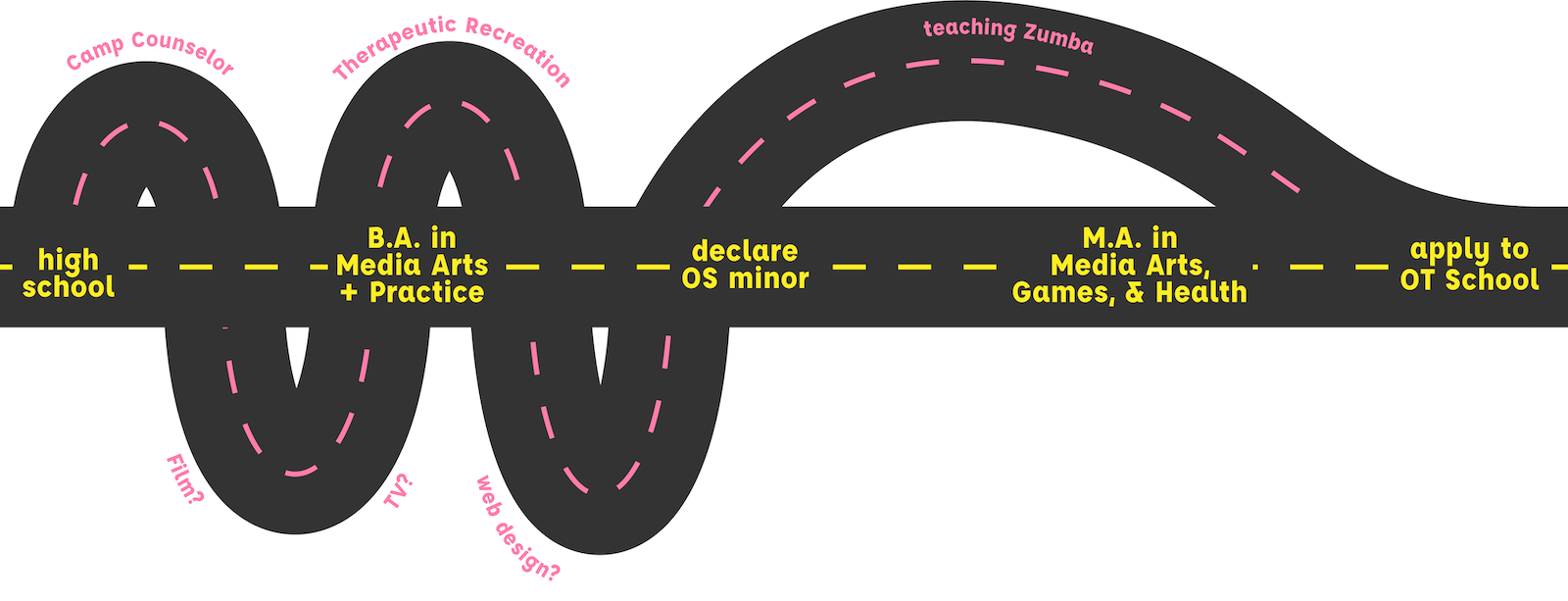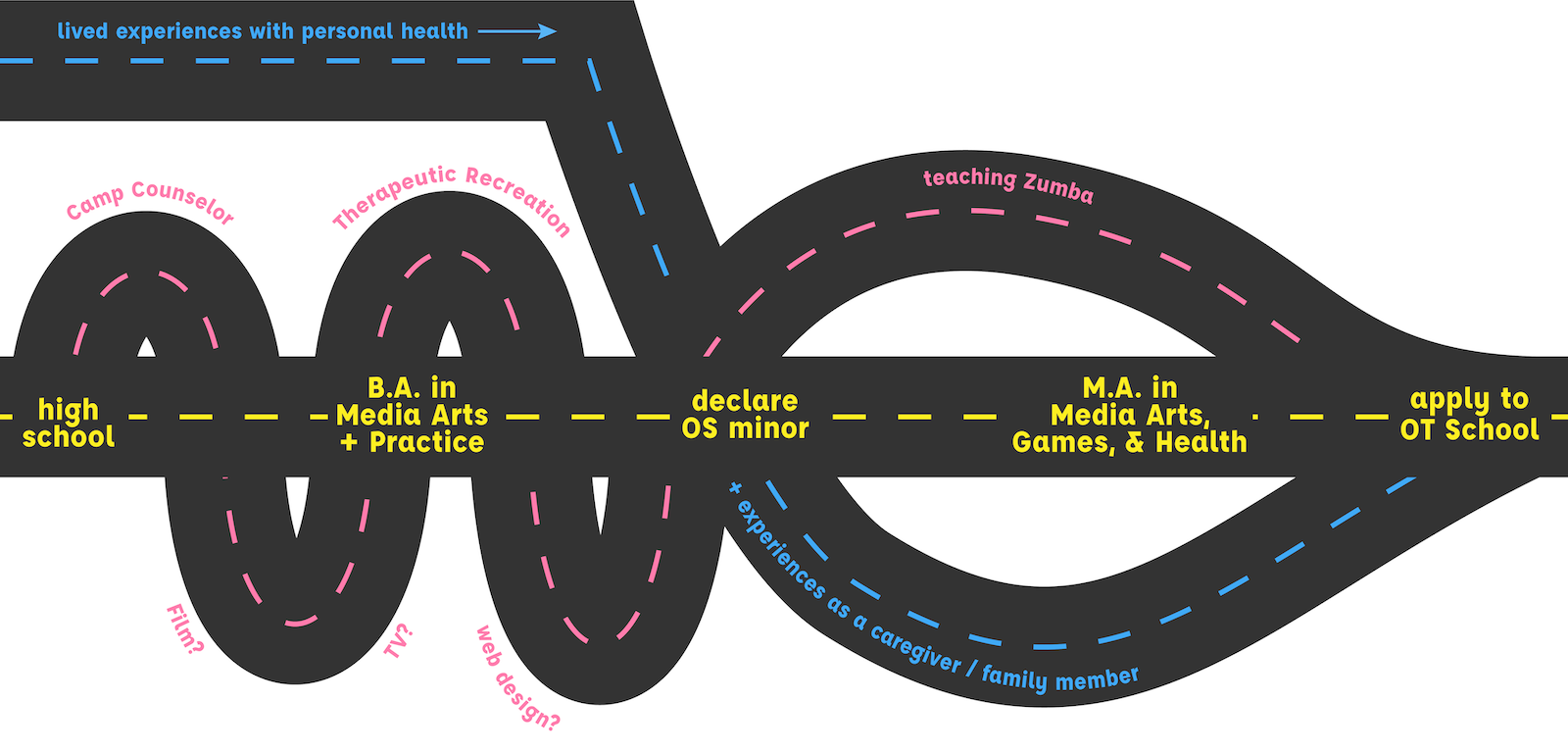Student Blog
Externship project — The experience of spiritual participation among people with intellectual disabilities in an evangelical church in Hong Kong ⟩
September 15, 2021, by Global Initiatives Team
Diversity Externships International
By Rebecca Ka Ki Tam
Post-Professional Master’s student
This externship project was inspired by the concept of occupational justice. I worked as a pediatric occupational therapist in preschool settings in Hong Kong before studying at USC. During those days, I had little knowledge about occupational justice. My studies at USC have expanded my understanding of occupational justice and greatly inspired my belief that occupational therapists can advocate for everyone’s right to participate in everyday occupations regardless of age, ability, gender, social class, or other differences (American Occupational Therapy Association, 2020; Nilsson & Townsend, 2010, p. 58). This concept has allowed me to reflect on my experience volunteering in a church in Hong Kong that pioneered spiritual participation among people with intellectual disabilities (ID). I experienced the joy among people with intellectual disabilities in their Sunday services. I wondered, however, whether spirituality is vital to their well-being. This population is one of the most controversial populations to serve in churches since many people believe that individuals with ID cannot fully understand the concept of faith. Thus, I became curious to know more about spirituality in this population — what is their experience in this occupation? How important is faith among people with ID? As revealed in my full article, I started this externship project to explore spiritual participation among people with intellectual disabilities. I conducted interviews in a church that pioneered spiritual participation among people with intellectual disabilities in Hong Kong. I interviewed a participant with severe ID, the participant’s caregiver, a volunteer, and two pastors. I also interviewed Professor Sarah Shea, who is involved in research relating to practical theology and theologies of disabilities and who ministered to marginalized populations at Hong Kong Baptist Theological Seminary.
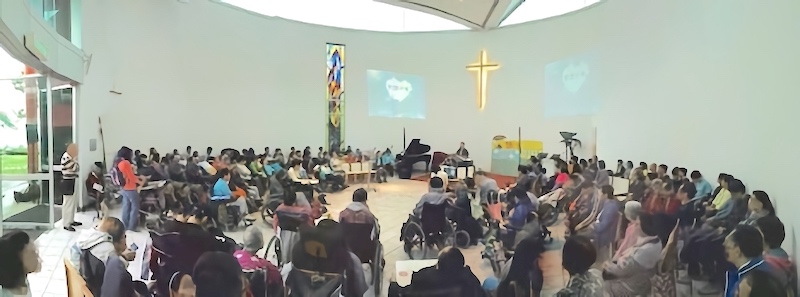
Participants were participating a Sunday Service in an evangelical church that pioneered the facilitation of spiritual participation among people with intellectual disabilities in Hong Kong
One memorable experience during this project was my interview with Anna (pseudonym), who has a severe ID. During the interview, she prayed for me, sang me a gospel song, and joyfully asked me to accompany her to church. Anna revealed how much she loves church life. I was very touched by her warm welcome and explicit love. Her caregiver shared with me that spiritual activities were unique in that they have helped Anna understand more about life and death, and overcome loneliness.
Anna initially was not comfortable talking to me during the interview. At first, she frequently walked away and ignored my questions. I then tried to talk in simple sentences and treated her as a friend. She gradually became more relaxed, sat down, and chatted with me. It reminded me of a pastor’s sharing that it is always important to be “present” — “Take your time, no rush. Be there with them, despite their circumstances, and treat them genuinely as true friends.”
In this project, I further reflected on how the arbitrary binary of “typical” or “atypical” classifications has inevitably become a barrier to genuine communication. Despite differences, we can always treat each other as true friends, learn from each other, and accept support and help from each other. I used to have a misconception that people with different intelligence might have different needs. Thus, it might be suitable to segregate people into various groups according to their needs. However, I realized this misconception was a barrier that had obstructed my genuine interaction and friendship with people diagnosed with intellectual disability. There should not be hierarchies in interaction, but we should celebrate our diversity. In an interview, a pastor shared that occupational justice probably does not merely focus on enabling people to participate in a particular occupation but also emphasizes the meaningful interaction among different people within that context. I envision that the concept of occupational justice will be more widespread someday, and I hope this article will motivate the public to advocate for occupational justice among people with intellectual disabilities.
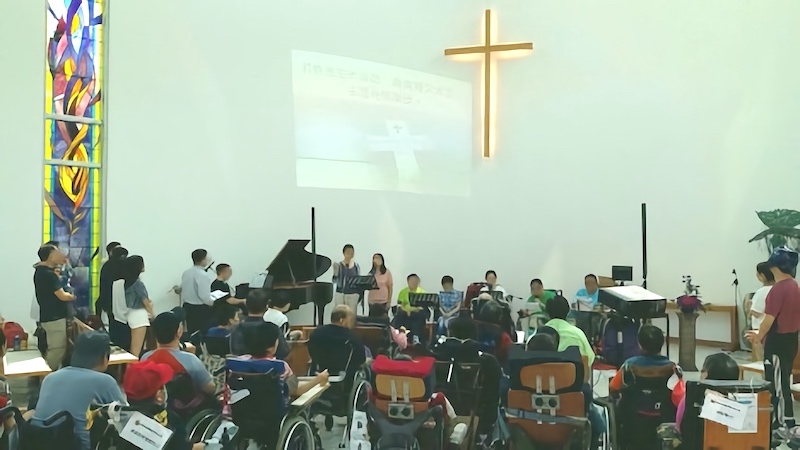
Participants, no matter with disabilities or not, were leading worship
References
American Occupational Therapy Association. (2020). Occupational therapy practice framework: Domain and process (4th ed.). American Journal of Occupational Therapy, 68(Suppl. 1). S1-S48.
Nilsson, I., & Townsend, E. (2010). Occupational justice — Bridging theory and practice. Scandinavian Journal of Occupational Therapy, 17, 57–63. https://doi.org/10.3109/11038120903287182
Tam, R. K. K. (2021, July 15). The experience of spiritual participation among people with intellectual disabilities in an evangelical church in Hong Kong
⋯
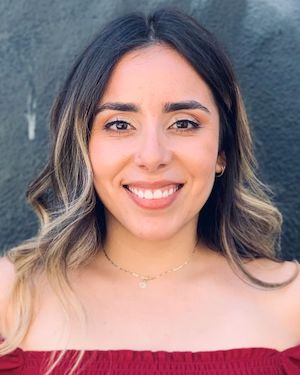
Dear Zoom, it wasn’t you ⟩
September 14, 2021, by Silvia
I’m just going to say it — I miss Zoom University.
Zoom University and I had a toxic relationship and although it wasn’t my first, it certainly is the only one I miss. Sometimes you really “don’t know what you have till it’s gone.” Don’t get me wrong; I love being on campus, seeing all my beautiful friends, and making real-life connections with my professors, pero like*. . . it’s hard out here.
Before making the transition back to in-person classes, after over a year of Zoom, I never truly realized or acknowledged how much work it takes to be an occupational being, aka a student. Let’s just consider some of the things that we didn’t have to do when Zoom was part of our lives (or at least my life):
- Get ready in the morning (if you still did this, I am proud of you and I admire you)
- Prep lunch
- Pack bag(s)
- Leave the house
- Drive to campus
- Find parking
- Walk to class
- Sit in class
- Actually pay attention in class (R.I.P mute and camera functions)
- Socialize
I’m sorry, but the fact that I can’t get up and walk to my fridge for a quick snack or mute myself/turn my camera off and lay down on my bed for a second is rude. Also, do you know how intense my phobia of getting stuck in LA traffic on a school morning is? Ok never-mind the phobia, have you seen those gas prices? Seriously though, transitioning back to in-person classes has been quite an adjustment that I wasn’t fully prepared for.
As much as I hated being confined to Zoom at home, I had a greater sense of control over my entire school experience and I loved that about our relationship. I didn’t have to worry about traffic, whether or not I would find a parking spot, or being late for that matter. I could monitor the sound level, air temperature, light intensity, number of guests—basically everything that I have absolutely no control over in the underground lecture hall, G 37. G 37 induces sensory overload in my body and exhausts me; it makes me reminisce the good times with Zoom.
I feel guilty for hating Zoom so much when all it did was love me and be there for me through the hard times, aka the pandemic. Yes, it gave me migraines and worsened my vision, but it also let me sleep in, eat during class, lay down between lectures, and spend my money on things other than gas. If I am being honest, it wasn’t Zoom, it was me. I was so upset and stuck on the idea of being “robbed” from my graduate school experience that I didn’t value or appreciate all the good things Zoom had to offer. I thought I was ready to move on—to be 100% back in-person and on campus—but what the heart wants is not always what the body wants or needs. While my heart is happy to finally see and meet my cohort and class in real life instead of a square on a computer screen, my body is tired and needs time to adjust.
I know I am not the only one feeling this way, and I just want you to know that you have permission to miss Zoom too. Listen to your body, allow it to rest and recharge as it adjusts to yet another change.
*Common Spanglish phrase meaning “but like”
⋯
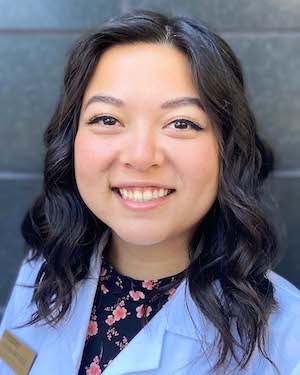
All roads lead to OT ⟩
September 8, 2021, by Alyssa
The first time I heard the phrase “occupational therapy” I was standing in the freshman dorm room of my future best friend (+ former Chan student ambassador) Noelle; I had just moved in down the hall. She told me about the BS-MA program, and I thought, that’s cool and then did not think about OT again for 2 years.
—
That’s the simple start to my messy story answering the question “Why OT?” I think of it as driving down 3 roads at the same time. To help navigate, I’ve included some illustrations.
Road 1: Academic Life
While media studies and OT may seem unrelated, this road was the most direct.
Freshly graduated from a media-focused vocational high school, I was excited to don my new hat as a student at the USC School of Cinematic Arts. Several of the classes for my Media Arts + Practice major focused on media ethics and the impact of technology on daily life, which built my interest in the use of media outside of the entertainment industry. I had a particular interest in media for healthcare and bounced around between a few different minors to explore this intersection. When I ultimately declared my occupational science (OS) minor, I knew I had found the perfect way to combine my interests in both arts and healthcare. For my undergraduate senior thesis, I prototyped an assistive device designed to help parents practice self regulation strategies with their children.
In the year following, I completed my OT school prerequisites and applications while pursuing my MA in Media Arts, Games, and Health. A natural transition between media and OT studies, I sharpened my research skills and broadened my understanding of technology use/gaming as an occupation.
On this road, I ignited my interests in interdisciplinary research and excitement for OT studies.
Road 2: Work Life
I’ve always been a bit of a workaholic. So, on top of all that school, I spent my extracurricular time trying on a bunch of careers.
I spent my freshman and sophomore years dream hopping from film editor to TV producer to website coder to themed entertainment designer. I worked intense hours at USC’s student TV station and explored my interests further with internships at a news station and a science museum. These were all incredibly interesting experiences, but none of them felt right for me.
In the off season, for 5 summers, I worked as a camp counselor at my local parks system. In my 6th summer, I transitioned into the therapeutic recreation division, providing one-to-one support for children with disabilities on general day camps. These were the first jobs that showed me that going to work doesn’t have to feel like work. The only other job I felt this way about was teaching Zumba at the USC gym.
On this road, I realized the commonality between jobs I truly enjoyed was forming connections and making a direct, meaningful impact on others.
Road 3: Personal Life
In the same semester that I declared my OS minor, I was supporting a loved one through rehabilitation following emergent open heart surgery. As I stayed involved in their recovery, I noted how their re-engagement in meaningful occupations, such as returning to work or playing basketball again, were what gave them and our family a sense of hope among the hardships. It was just like what I learned in my OS minor courses — that holistic healthcare is about more than survival.
I have also had exposure to the patient perspective through my experiences with chronic illness. After years of doctor’s appointments, I’ve seen the kind of provider I want to be — one that emphasizes the practices of listening, patience, empathy, and advocacy.
On this road, I saw the power of meaningful occupations and found my passion for providing individualized care.
—
If I could go back in time to my first conversation with Noelle and tell myself to look into/pursue OT right away, I wouldn’t. The non-traditional path was the way for me.
That being said, it feels nice to keep my eyes on one road now. Can’t wait to see where it goes.
⋯
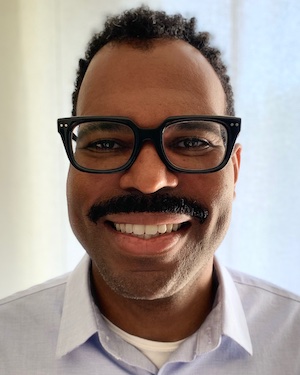
An OT walks into a bar . . . ⟩
September 5, 2021, by Guy
In September about three years ago, I was bartending in Brooklyn, NY and a group of teachers, some regulars of mine, walked into the bar with their new colleague, an occupational therapist. This OT had just made the switch to occupational therapy from another career. Just like I was attempting to do! At this point, I had started the process of switching careers, I had just finished taking my first pre-requisite class for OT grad school at a local community college, and I had not really had the chance to have any long in-depth conversations with anyone who had gone back to school to be an occupational therapist. In many ways I was still in the dark not only about the profession but what exactly I had got myself into — pre-requisites, needing volunteer hours, grad school applications — what? Also, I had been wanting to get a chance to do some observation/volunteer work in adult inpatient acute settings and had been having difficulties securing any place that would allow me to do so. Fortunately, this occupational therapist turned out to be the friendliest, most helpful person. They broke down the next steps I would need to take to achieve my short term and long-term goals — great activity analysis. They then connected me to a volunteer opportunity at the local VA hospital in Brooklyn, where I first heard about the USC occupational therapy program (Thanks Anita K., USC Class of 2012) and learned so much about the day to day of an occupational therapist at the VA.
Over the next year whenever that occupational therapist walked into the bar, they would always give me what I now know was invaluable information about the profession of occupational therapy. To this day, I credit them for not only giving me a very clear idea of their own experience of changing careers and becoming an occupational therapist, but more importantly I am grateful for getting a first-hand view of what my future path might entail. Through interacting with this occupational therapist, I came to realize that it wasn’t crazy to be going back to school after being out of school for so long and that becoming an occupational therapist was what I thought it would be and more. In the end, I credit those conversations and that opportunity at the VA for helping me to learn so much about the profession and providing me with a fuller understanding of what I had got myself into. Before that occupational therapist walked into the bar, I thought I knew why I was making this career change but didn’t quite know how. I was becoming an OT because I wanted to work one on one with people to do those things that are important and meaningful to their lives, and I felt I could not continue to do the work I had been doing. Also, I have seen the beauty and impact of occupational therapy in action. I witnessed occupational therapists help students find the joy of being a student, and I have seen the transformative effect of occupational therapy in helping people like my proud mother, who had Parkinson’s, to maintain a sense of dignity while adapting to living with a degenerative disease. Despite this knowledge my ability to interact with an occupational therapist helped me to clarify why and also how I would make this career change. Being able to have conversations with an occupational therapist helped me to go into this new career with a sense of purpose and understanding which I carry with me to this day.
Thank you Sadie, that OT that walked into the bar, and to all of the occupational therapists: Maurice, Anita, Leah, Heather, Elena, Ryan, and so many who took the time to talk to me about how to become an occupational therapist. You not only helped to clarify why I was becoming an occupational therapist but helped to get the process started. I wouldn’t be here in my second year of graduate school without your freely given insight, advice, and much needed guidance.
⋯
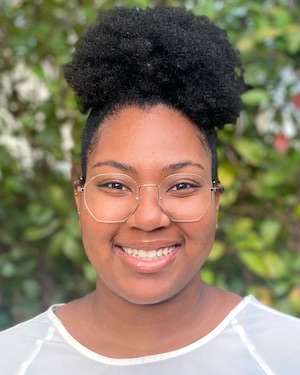
You, Me, and the OTD ⟩
September 5, 2021, by Kayla
Admissions Fieldwork What are OS/OT?
Being a Master’s student at USC Chan was an amazing experience filled with lots of learning, involvement in an amazing community, and one-of-a-kind experiences. So there’s no surprise that making the decision to apply and complete the Post-Professional OTD was quite simple. To me, this program means more than continuing my course of study or earning the distinction of “Dr”. To me, this program is all about personal and professional growth! Over the course of this next year I hope to work to reach a place where I will be prepared to achieve my professional goals and transform into the best therapist that I can be.
Along with choosing to complete the OTD with the above in mind, I could not pass up the opportunity for the amazing mentorship opportunities that are built into the program! Through my fieldwork experiences during the Entry-Level Master’s program I learned that I really really (really) love acute care OT. As I did my research on the different residency tracks offered, I was looking for an experience that would allow for specialized mentorship. I wanted a track that could support me while I work on my weaknesses and amplify my strengths to help me become a better therapist within my specific setting. The advanced clinical practice track consisted of everything that I was looking for and proved to be the perfect fit for me.
In the time preparing to embark on this journey and in the very short time since classes have begun, I have gained a deeper understanding of what I want to get out of this experience and ultimately made important decisions about my future career. That is honestly the biggest difference between the Master’s program and the OTD program. As a OTD resident you have the opportunity to decide and design your experience, from the practice context to your focus during your doctoral year. This freedom to tailor your residency plan is what makes this experience so meaningful and unique. And don’t worry, if the sound of that much freedom is off-putting to you, you are not alone during this experience!
Through all of the moments of feeling overwhelmed, doubting myself, and wondering if I would be able to find a residency site that was everything I wanted, I am so grateful that I stayed the course and found the site that is perfect for me! I have already gained so much so early in this journey and am excited to see where it takes me. More than anything, I am excited to be your OTD ambassador and be a part of your OTD journey as well!
⋯







